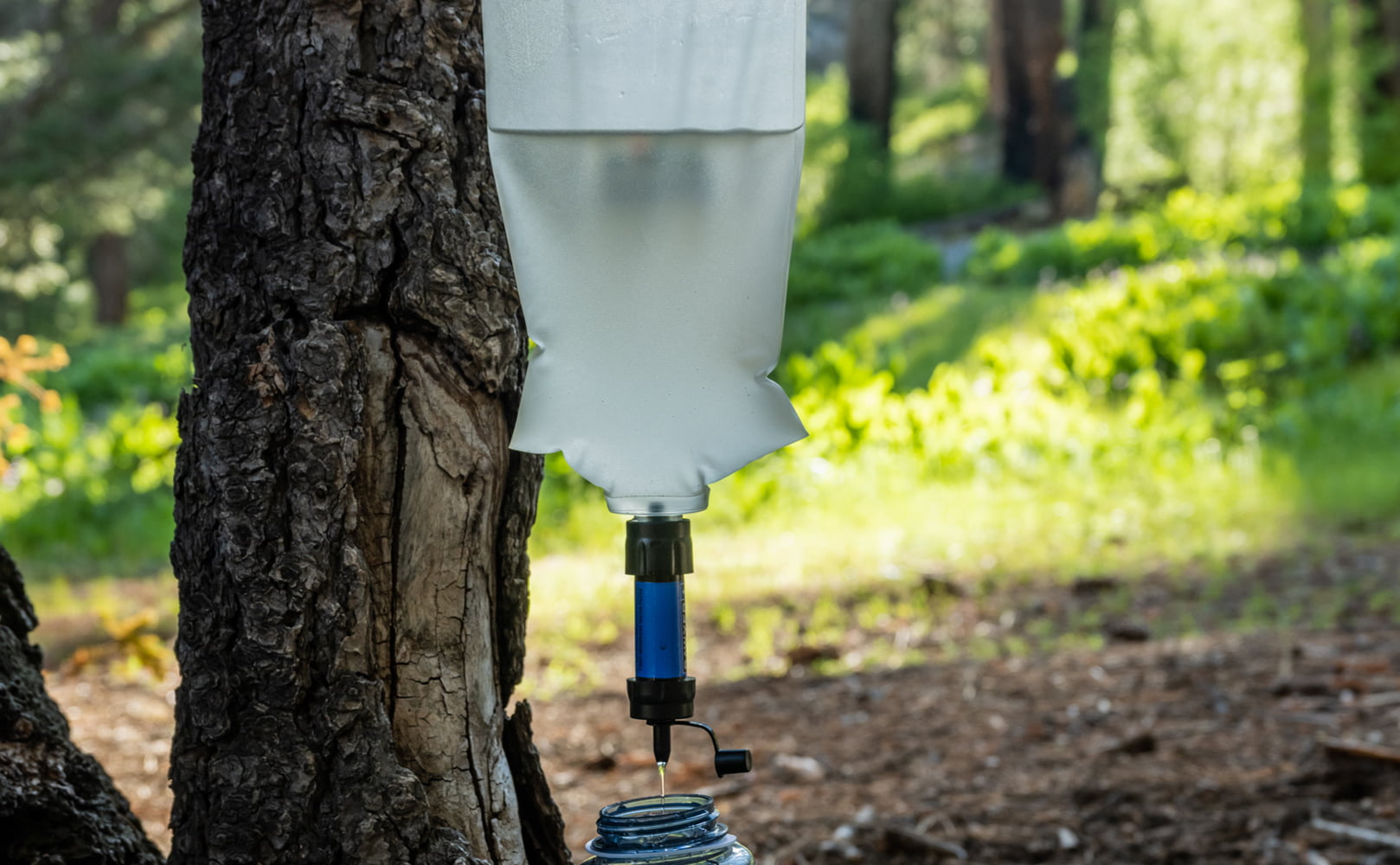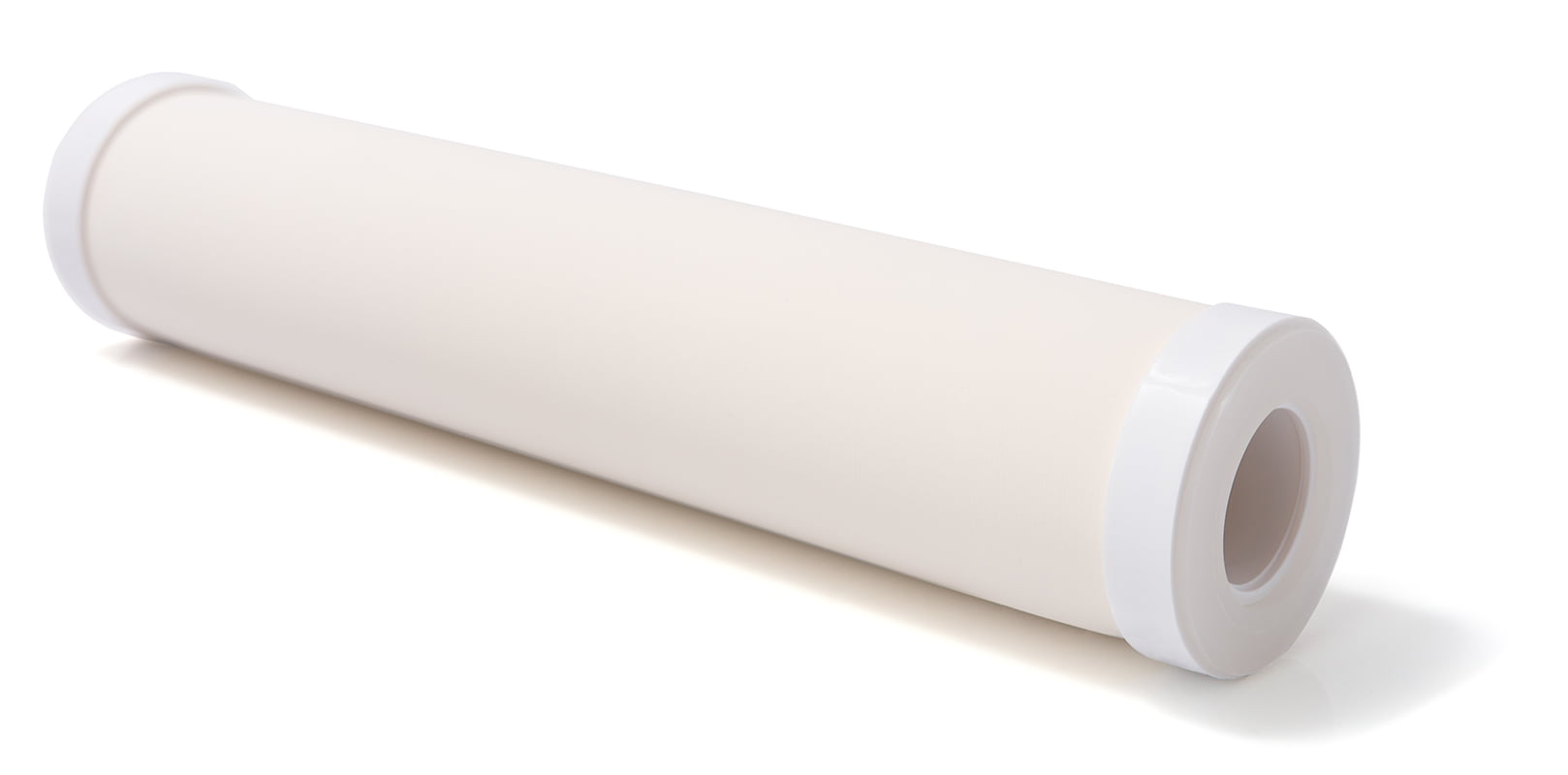Gravity Water Filter Pros and Cons | Complete Overview
Written by: Alexandra Uta // Last Updated: Mar 25, 2023
This page may contain affiliate links. If you buy a product or service through such a link we earn a commission at no extra cost to you. Learn more.
Using a gravity water filter is a good way to provide yourself with a fresh supply of water without being bound by the need for electricity or water pressure.
The main advantage of this type of filter is that it doesn’t need any external power to work, as it uses gravity to force the water through the filtering elements.
But how does a gravity water filter work exactly? Let’s find out!
Key Takeaways
- Gravity water filters are great for emergency situations and outdoor use. Gravity water filter bags, in particular, can be stored away and transported with ease.
- Countertop gravity water filters can also be used at home provided they match the quality of your water supply (always confirm).
- Gravity water filters are also easy to set up and maintain at minimal cost.
- However, they don’t provide the most thorough purification on the market right now. If your water is heavily contaminated with different types of contaminants, you might want to consider other filtration methods.
What Is a Gravity Water Filter and How Does It Work?
A gravity water filter consists of two chambers, one stacked on top of the other, with a filtering element between them.
In some cases, multiple filtering elements may be used in parallel to improve the overall performance of the system, meaning filtration speed.
Since water is dragged down by gravity, there’s no need to create additional water pressure in the system. You can simply fill up the top container and let the filter do its work.
Speaking of, depending on the model, gravity filters use different types of filters and filter media. Most effective, especially for outdoor use, are ceramic filter shells with a carbon + ion exchange core. This provides for broad contaminant removal which includes bacteria, cysts, chemicals, and heavy metals.
The Different Types of Gravity Water Filters
Gravity water filters come in two main variants: Countertop and filter bags. They both have certain advantages and disadvantages.
Countertop Gravity Water Filters
Countertop gravity water filters are mainly intended for indoor use, as the name implies. It’s possible to take one with you when you’re going somewhere, but it’s not the ideal solution and you’re better off using a gravity water filter bag in that case instead. Countertop filters tend to be large and rigid, making them somewhat difficult to move around, especially when full.
Gravity Water Filter Bags
A gravity water filter bag is designed for outdoor use. It’s a large, flexible bag that can be rolled up into a small cylinder for convenient transportation.
Using a gravity water filter bag is straightforward. You just fill it with water and find a high spot to hang it from – like a tree. Gravity will force the water out of the bag, through a filter, and into a holding reservoir.
Gravity Water Filter Pros
Can Always Be Used, Even Without Electricity
The main advantage of a gravity water filter is that it’s always available, even when the power goes out. This makes it great for emergencies, as well as situations like camping trips where you don’t want to lug a massive generator around with you.
Cheap and Simple to Maintain
Most gravity filters on the market are rather cheap compared to other water filters, and they don’t take a lot of effort to maintain. You just need to learn how to clean the filter and prevent physical damage to it.
Adequate Filtration for Most Purposes
The types of filters used in gravity-based models should suffice for most people’s needs, as they can remove most types of contaminants you’d deal with at home or on a camping trip or in similar circumstances. So while there are more thorough water filtration methods available, this one should be enough for most situations.
Gravity Water Filter Cons
Takes Time to Filter Water
You must always wait for the gravity water filter to do its job before you can drink water. This makes it important to get a model with a large storage tank if you’re planning on sharing it with multiple people. Even that’s not ideal though, because water can start to develop a stale taste after it’s been sitting for too long.
Not Ideal for All Types of Contaminants
While the filtration methods used in gravity-based water filters are sufficient for most people’s needs as we outlined above, they are far from adequate for certain types of contaminants.
Bottom line: When you’re dealing with more specific contaminants, you might need to use an alternative filter to purify your water properly. At the very least, you should confirm that whatever gravity water filter you’re eyeing, the system is confirmed to remove the type of water pollutants in question.
Must Be Refilled Manually
There’s no convenient way to hook up a gravity water filter to a constant water supply, at least not without the use of additional equipment. This means that you’ll have to refill the filter manually all the time, which can get inconvenient pretty fast if you need a lot of water.
Are Gravity-Based Water Filters Effective?
All things considered, sophisticated gravity-based water filters are a great choice for keeping your water fresh and remaining independent of factors like electricity availability. They can work well at removing contaminants from water, and even though they might not remove everything that could concern you, they are still powerful.
What to Consider Before Buying a Gravity Filter
Before investing in a gravity water filter, you should consider several factors about how you’re going to use it. Mainly, you need to think about whether you’re buying this filter for indoor or outdoor use, and whether it provides sufficient filtration for what you need.
Indoors vs Outdoors
If you’re going to use the filter indoors, you should get a countertop model. As long as you have enough space for it and don’t intend to move it too much, the large size of this model shouldn’t be a problem.
Filtration Process Must Match Feed Water Quality
You must make sure that the filter elements used in the product match the quality of your feed water. If your water is too heavily contaminated, a gravity filter might not be able to purify it well enough – think pathogens.
Filtration Flow Rate
Gravity water filters are rather slow and there’s not much you can do to change that. This means that you need to get used to waiting for your water to get filtered, and you’ll often have to work with a slow flow rate. That may be okay for you, but it could be a problem for some people.
Portability vs Tank Capacity
A countertop gravity water filter is mostly intended for indoor use. If you want to bring it with you on a trip, you will have to make a compromise between portability and storage capacity. A large tank can be difficult to move around, especially if it’s completely full.
Filter Life
You will have to clean the filter elements to prevent them from clogging up. This should ideally be done once a week, but you might need to do it more often in some cases, like when you’re dealing with more heavily contaminated water.
Materials
Steel vs plastic; some filters are made of more durable materials that can last longer. It’s worth spending a bit more on those if you intend to use your filter for a long time.
If you have any questions about the pros and cons of gravity water filtration please don’t hesitate to leave a comment below!
Information provided on BOS is for educational purposes only. The products and services we review may not be right for your individual circumstances.
We adhere to strict editorial guidelines. Rest assured, the opinions expressed have not been provided, reviewed, or otherwise endorsed by our partners – they are unbiased, independent, and the author’s alone. Our licensed experts fact-check all content for accuracy. It is accurate as of the date posted and to the best of our knowledge.



